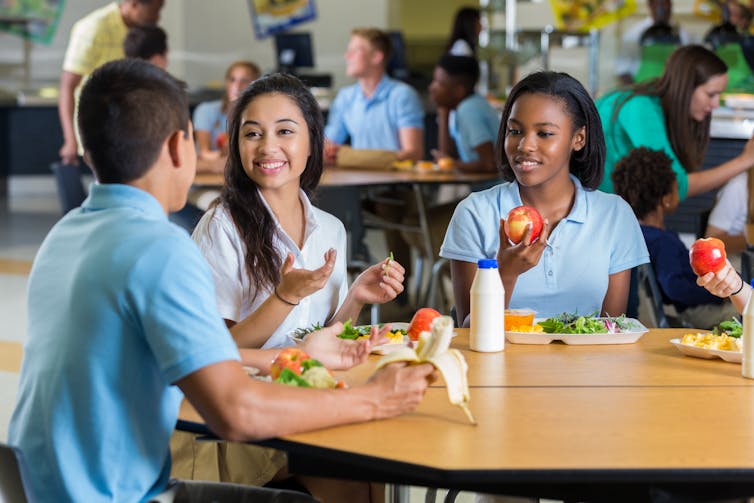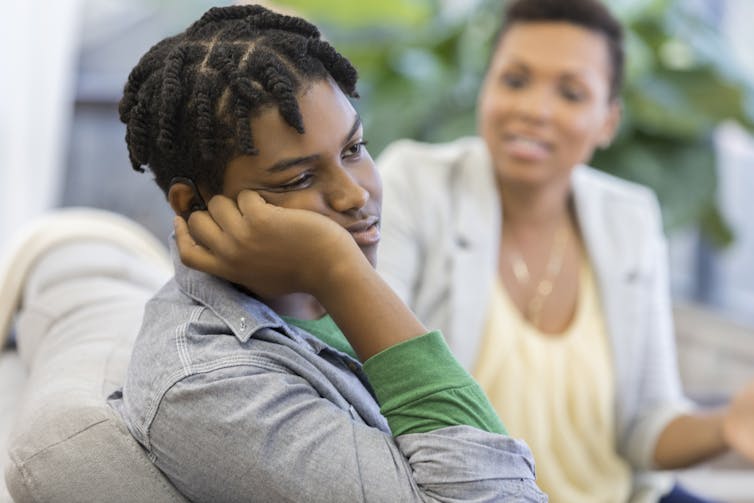The last thing adolescents want is to be trapped at home alone, by order of their parents. We look at why teens are hard-wired to resent being in lockdown and how to support them through these difficult times.
“Can’t I just go see one friend?”
“I need to hang out with my friends.”
“You are being overprotective and unreasonable!”
Social distancing is both necessary and hard. If my Facebook news feed and anecdotal experience in my own family are at all representative of larger trends, adolescents are especially feeling the pain. Separating from others goes against basic human needs for companionship and connection that everyone feels, yet the challenge of social distancing may be especially difficult for teenagers.
Social distancing contradicts much of what being a teenager is all about. As a psychology professor who studies adolescents’ peer relationships, I find it helpful to think about this reality from a developmental perspective – assuming certain tasks arise at different periods during development, and that mastering them contributes to well-being and happiness. The typical changes that come with adolescence and the developmental tasks that confront adolescents help explain why they’re having a particularly hard time with social distancing.
Teens’ friends are their world
Adolescence is a time when forming and maintaining close, intimate friendships is a critical developmental task – a main “job” of being an adolescent. Teens are socially and emotionally prepared for this task, and achieving it provides them abilities they need for meeting the challenges ahead. Teens spend much of their waking time with peers and friends. Psychology research suggests that those relationships have important implications for adjustment and well-being.
In friendships, teens learn and practice social and emotional skills that are important now and for their success in future relationships. They learn how to give and ask for help and support; they work on conflict resolution, compromise and forgiveness; they learn about closeness, intimacy and reliability; and they figure out how to make others laugh and have fun together. Each time they practice these skills with their friends, they’re working on perfecting competencies that will be crucial for successful relationships throughout the rest of their lives.

SDI Productions/E+ via Getty Images
So much of this happens during face-to-face interactions when teens gather in the basement, legs and arms entwined as three or four pile on a couch talking and hanging out, or at the school lunch table when a dozen teens sit together at a table designed for half as many. Social distancing runs counter to what teens want and need to be doing with their peers and friends.
Becoming their own people
Another important task of adolescence is developing emotional and behavioral autonomy – feeling, thinking and acting as a self-governing person. Demands from parents and other authorities to stay home and practice social distancing make many teens bristle. They want to make those decisions for themselves.
As adolescents’ brains develop, their cognitive skills are advancing. Their decision-making abilities improve, and they start to think more abstractly and about multiple perspectives simultaneously. Those advances certainly help them better understand the global challenges we’re all confronting with COVID-19 than younger children might.
Yet, those advances also come with greater tendencies to see things as relative instead of absolute, to question adults and to be better arguers than when they were younger. And teens famously experience a type of egocentrism that can involve a feeling of uniqueness and invulnerability that might make them downplay the importance of social distancing.
Although teens are developing more adult-like cognitive abilities, they are generally more likely to make risky decisions than adults are. An adolescent and an adult may both think about the positive and negative consequences of social distancing, yet adults and teens may value them differently. A teen may emphasise the rewards of seeing friends, while an adult may put more weight on the health risks of contracting or spreading the virus.
Adolescents can adjust
Together, the social and emotional tasks of adolescence – developing intimate friendships and achieving autonomy – make teens uniquely resistant to calls for social distancing.
The cognitive changes of adolescence are in part responsible for the laments I’ve heard from parents of my 16-year-old’s friends, describing the endless arguing about parents’ draconian mandates to engage in social distancing.
I recognize that many people are confronting life-and-death situations or serious economic consequences for their families and do not have the luxury of worrying about angsty and argumentative teens. Nevertheless, it is important to consider the potential unintended consequences that accompany social distancing.
So what’s a parent to do?

SDI Productions/E+ via Getty Images
First, recognise that teens’ seeming all-consuming desire to be with friends is reasonable and exactly what they should want to do.
Second, encourage their social connections and help them figure out how to maintain those interactions, albeit from a distance. Perhaps relax prohibitions against screen time when it is used to connect with friends through FaceTime and Google Hangouts. For younger teens, actively help them host a Zoom dance party with their friends and think creatively about ways to maintain social interactions with technology.
Third, continue to talk with teens about the coronavirus and its consequences. Acknowledge the uncertainty everyone feels. Help them engage their developing critical thinking skills around news reports and graphs of data and other evidence about the beneficial effects of social distancing.
And finally, understand that teens’ push for autonomy, their arguing about the unreasonableness of what they’re not allowed to do and their lack of unbridled excitement about forced family time all fit with the social, emotional and cognitive tasks that define adolescence.
[You need to understand the coronavirus pandemic, and we can help. Read The Conversation’s newsletter.]![]()
Catherine Bagwell, Professor of Psychology, Oxford College, Emory University
This article is republished from The Conversation under a Creative Commons license. Read the original article.
How are your teens coping in lockdown? Tell us in the comments below.




















8:36 am
4:43 pm
2:59 pm
2:20 pm
12:55 pm
5:03 pm
7:21 am
11:35 pm
3:47 pm
1:58 pm
9:35 am
8:47 am
7:35 am
6:37 am
10:30 pm
9:07 pm
8:30 pm
2:08 pm
9:21 am
4:42 am
- 1
- 2
- 3
- »
Post a commentTo post a review/comment please join us or login so we can allocate your points.